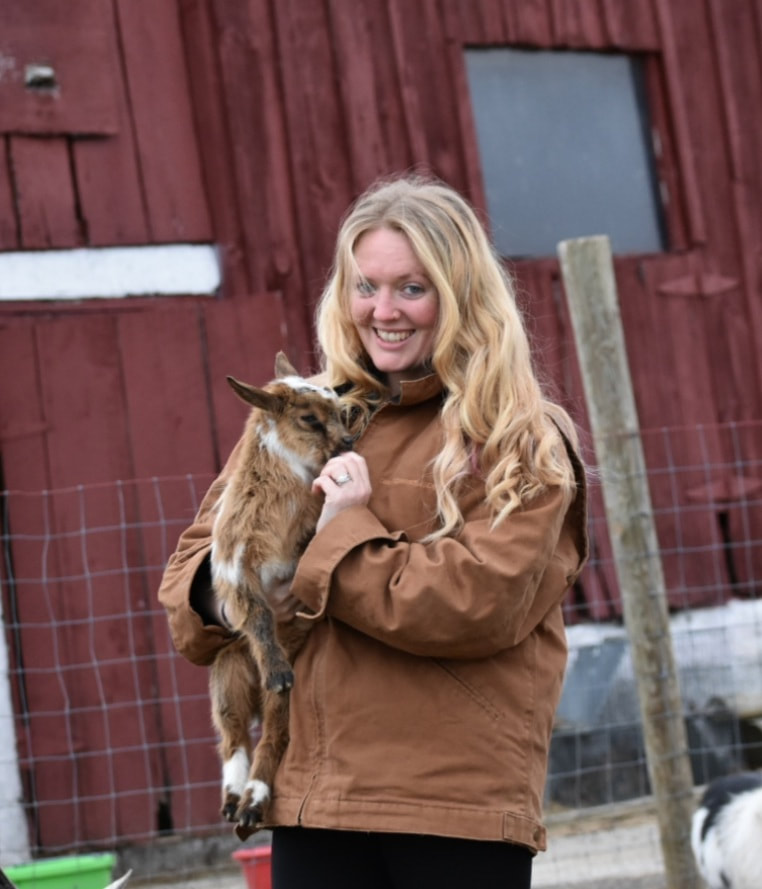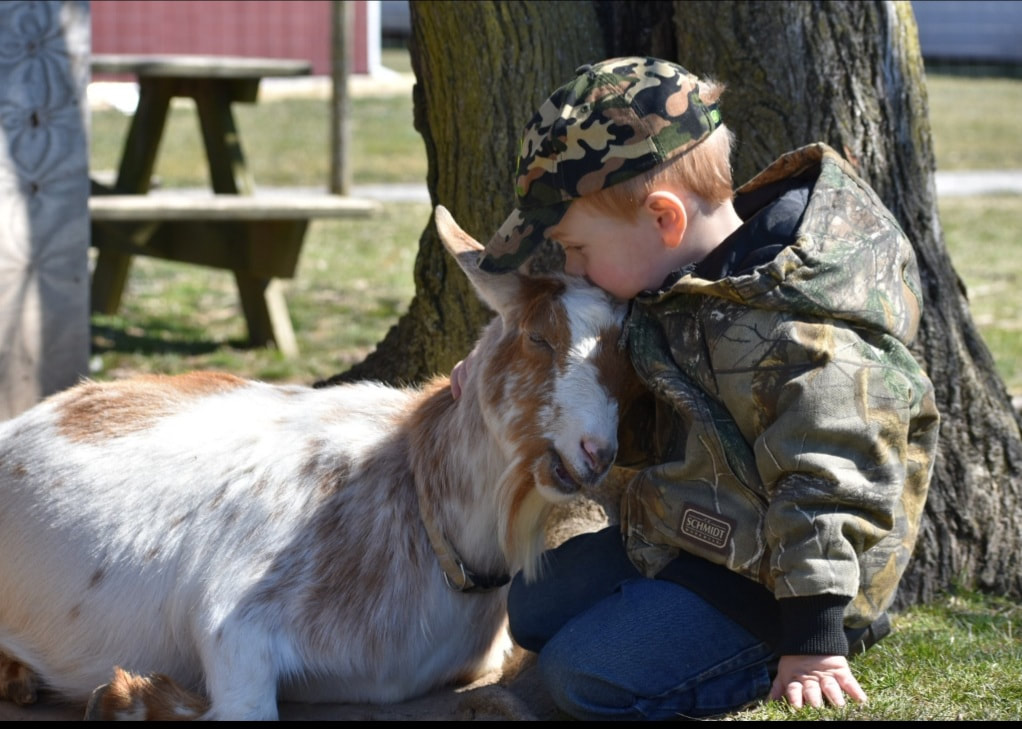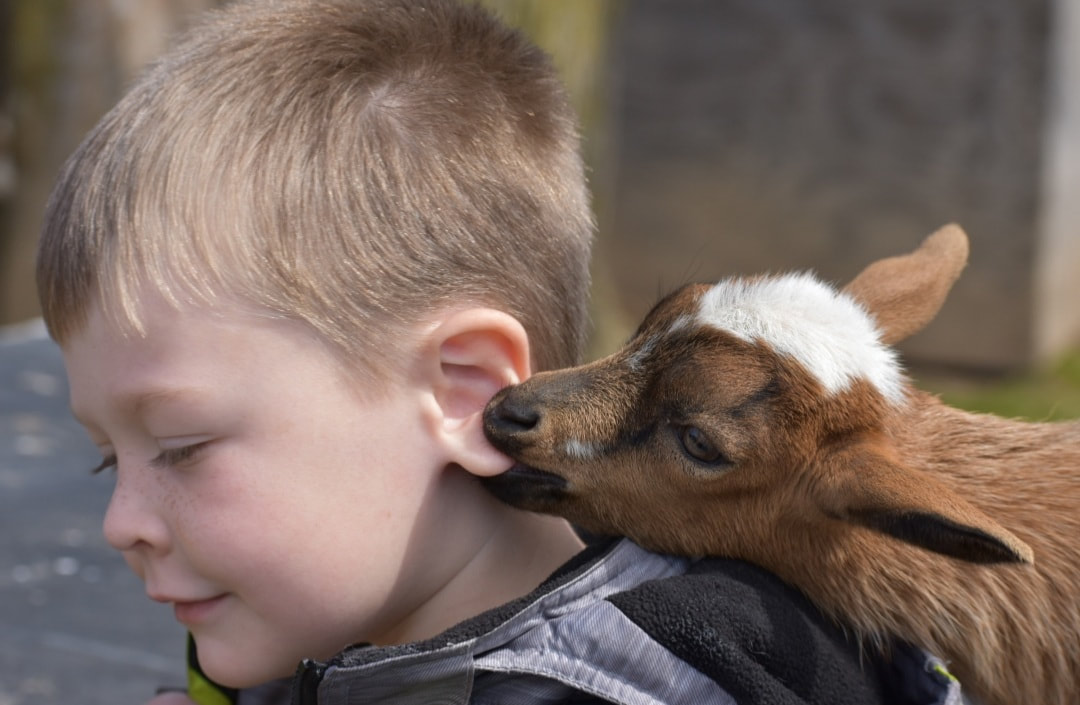It all started in 2014 with a pair of fainting goat wethers. We quickly transitioned from the pet goat world, to the mini dairy goat world. Nigerian Dwarf goats fit the bill, and so started Shine On Goats!
We brought an ASDR Miniature Australian Shepherd into the family in 2018. Her name is Shine On Wildflower (Daisy). Daisy is our beloved pet first, but she does show herding potential! We bred her to have pups in 2022, and she was a great mother. For more info, check out our Mini Aussie page.
We brought an ASDR Miniature Australian Shepherd into the family in 2018. Her name is Shine On Wildflower (Daisy). Daisy is our beloved pet first, but she does show herding potential! We bred her to have pups in 2022, and she was a great mother. For more info, check out our Mini Aussie page.
 Owner and care taker, Madison, with a Shine On goat kid
Owner and care taker, Madison, with a Shine On goat kid
Our main focus here, at Shine On, is producing healthy, happy & friendly goats with great conformation, and good milking potential. These goats have some fun colors too... so if you are looking for a show goat prospect, home-milker, or pet, we may have just what you need! Never hesitate to send us an inquiring email. We keep a very small herd, so we have goats available quite often. Our location is in beautiful, Glen Arm, MD.
If you are looking for a great website to learn more about goat care, visit http://www.fiascofarm.com/ They have some great information, although it may be slightly out of date now* Always keep good relations with your vet, and updated on current recommendations for goat healthcare. See below for more goat care info...
Also visit www.adga.org (American Dairy Goat Association) for info on everything their registry has to offer.
For goat supplies:
http://www.jefferspet.com/
http://www.caprinesupply.com/
~Shine On
Since I have had quite a few questions/inquires about general goat care, I have decided to write up some basic care requirements goats need:
A friend! They are herd animals, you always need at least two goats together (although good luck staying at just two goats, LOL!) The only exception is a breeding buck, that is within eye-view of his ladies, he can be housed alone, although it's not preferable.
Roughage. That is and should be goats main source of food. Whether it be fresh browse of weeds/brush (check here for safe vs poisonous plants https://fiascofarm.com/goats/poisonousplants.htm ) or quality hay, that should always be the main part of their diet! Pelleted and grain feeds come next. If you have a pet wether, or dry doe, good quality browse or hay is all they'll need. Pregnant does, start slowly introducing a goat feed to her diet in the last month or so of pregnancy. Does in milk need more feed to help keep them in condition. I do not have a magical answer for this. Simply feel your goats. If they have zero fat deposits on their sides, and are extremely boney, they need more calories. With dairy goats, you should always be able to feel some bone on them, if they are hard to find or you can't feel their ribs, they are probably too fat! Also, always introduce new feeds slowly as to not disrupt their rumens, and cause food scours (diarrhea). Bucks need a feed that contains ammonium chloride in it to help prevent urinary stones. I feed my bucks chaffhaye as well, some do not feed bucks alfalfa, but mine seem to do well on the same diet as my does. Grass hay available at all times ( I do not have much browse available, also make sure the hay is not moldy!) Chaffhaye is fed once a day when they are dry, and twice a day when they are in milk. Do not let goats eat chicken feed, no matter what they tell you! They love it, but will cause them bloat if they eat too much. Always have fresh water available, they are kind of water snobs. Has to be clean! Also, they need loose minerals specifically formulated for goats constantly available. Blocks will not get the job done, has to be loose!
Deworming. Goats will always carry parasites, of some sort (although some are more of a concern than others!) When they get overloaded, that is when you have issues. Get a local vet to look at your goats fecal samples or send away to http://www.midamericaagresearch.net/ for them to check for parasite overloads. They can also reccomend the proper dewormer to use for the bugs they may have. DO NOT worm on rotations, only worm as needed*** When you constantly deworm your herd, the parasites build up a resistance, rendering the chemicals not as effective overtime. Also, there are herbal dewormers that some breeders swear by. I use herbals, but also chemicals as needed. https://www.firmeadowllc.com/ has good herbals. I personally do not use wormwood on pregnant does though, http://fiascofarm.com/herbs/ has a weekly wormer I find safer for pregnant does.
Grooming. They need their hooves trimmed every 6-8 weeks, sometimes sooner. Here is a good video showing how, just use a sharp set of pruning shears and be careful not to cut yourself! Also, a grooming or milk stand will come in handy for this. https://www.youtube.com/watch?v=ugMu_c2lGyI It is a good practice to use the famacha method while you have your goat up on the stand for their hoof trimming. Basically pull down their lower eyelid to check for anemia that could be cause by parasite overload. Here's more info https://en.wikipedia.org/wiki/FAMACHA
Goats do not have to be clipped every summer, however doing so will kill any external parasites such as lice, that they may have picked up from straw bedding during the winter. The sunlight will kill any of the bugs attached to them. When milking a doe, it is always good to keep her udder hair trimmed so you don't get lots of hair in the milk.
Housing/Fencing. Nigerian Dwarf goats need a 4 foot fencing, with enough room to run and jump around. They enjoy rock piles, tables, old kids playgrounds and similar/safe items to lay and play on. They prefer to sleep up off the ground, but as long as they have a shelter that is weather and predator safe, they will be happy. Shade in the summer is great, and goats hate rain and wind. Seriously, they think they are melting when it rains, and will blow away in the wind.
Vaccines. Many people give a CDT vaccine every year ( although further research has suggested they may need boosters every 3-6 months, to actually have coverage!) I personally do not anymore, but they could help prevent tetanus and enterotoxemia (also called overeating disease, where basically their gut flora grow out of whack and it could be deadly!) I know of other herds, that vaccinate, that have still contracted these illnesses. It truly is a personal choice! Location also plays a role. Some areas are more prone than others. If you choose not to vaccinate, always keep the antitoxins on hand! (Which should be done even if you do vaccinate, honestly.) There are other various vaccines available, consult your local vet for more info.
Those are most of the basic goat care essentials you need to know. I'm sure I'll add more as I get asked/ think of anything else :-)


